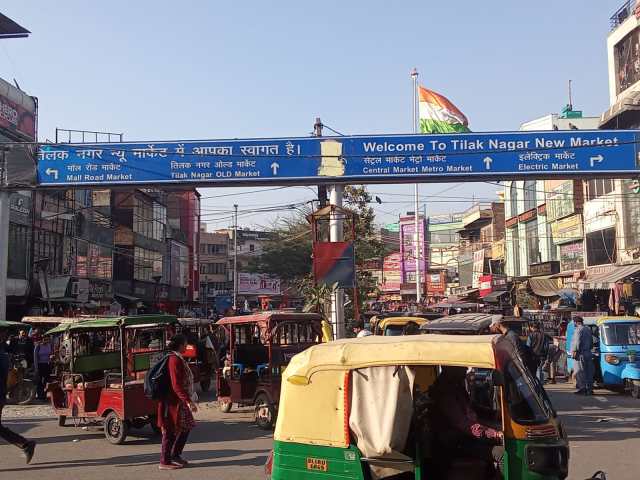As sops take centre stage in the Delhi Assembly election campaign, palpable class-based fault lines have emerged in parts of West Delhi, with the Hindu and Sikh working classes veering towards the ruling Aam Aadmi Party (AAP) and the middle class increasingly critical of the party’s convener Arvind Kejriwal for his “failure” to deliver basic amenities.
The traders in the area also appear divided. While Hindu traders are seen to be firmly backing the BJP, Sikh traders, though critical of the AAP, are keeping their cards close to their chest while not displaying much affinity for the BJP.

At the main market in Rajouri Garden, the only signs of the elections are the saffron flags of the BJP tied to lamp posts. Donning a jeans and a jacket, a Sikh businessman, Hardeep Singh Bhasin, says, “The BJP is going to gain some ground, and the AAP will slip a bit, though poor people will vote for Kejriwal. The Congress may also increase its vote percentage but is nowhere in the fray in terms of seats.” He says while some people may have wanted the Congress as an option, its candidate Dharam Pal Chandela is weak.
Story continues below this ad
Asked why he thinks the AAP is losing ground, Bhasin points out the garbage dumps in colonies. “What has the AAP done on the very basic things required for governance?” he asks, claiming that the BJP’s Manjinder Singh Sirsa will give a tough fight to sitting AAP MLA Dhanwanti Chandela. However, he feels the Kejriwal-led party will scrape through as the Congress is nowhere to be seen and there will be a split in votes based along class lines.
A little farther, Amarjeet Singh Kohli, an elderly Sikh man enjoying the winter sun outside his home, points to the piles of garbage lying strewn around on roads in the locality, “Sirsa is meeting people and campaigning hard. He may have a chance,” Kohli says.
The AAP’s chances will hinge on how many of the poor vote and to what extent as a bloc. The BJP will rely on Hindu votes — the AAP has managed to make deep inroads in this voting bloc over the last decade — and hope that the votes of Muslims and Sikhs, who are still seen to be ideologically open to the Congress, split.
At the entrance of the Rajouri Garden Main Market, Kejriwal is the preferred choice of some people. “Kejriwal is the one we will all vote for. He has given free travel to women and has reduced our power bills,” says Arun Kumar, who works at a small eatery and is out in the market for a cup of tea with two friends.
Story continues below this ad
“BJP paise waalon ki party ho chuki hai. Inki gaadiyan dekhiye. Gareeb ke liye to jhaadu hi theek hai (The BJP is a party of moneyed people. Look at their swanky cars. For the poor, the ‘broom’ is the correct option).”
Before the AAP burst on the scene, Rajouri Garden was a Congress stronghold, with the party holding it for two decades since 1993. It lost the seat to Sirsa (then in the Shiromani Akali Dal) in 2013. Two years later, the AAP won the seat but lost the 2017 bypoll to Sirsa, who contested for the BJP.
Across adjoining West Delhi localities with significant a Punjabi population, one senses a recurring class fault line. While most working-class voters are strong supporters of AAP, almost all middle-class or Hindu traders are fiercely pro-BJP. Among Sikhs, the polarisation is not that sharp. Most Sikh traders are critical of Kejriwal but are also not as enthusiastic about the BJP as their Hindu counterparts. Some wish the Congress had been stronger but add with an air of resignation that it is nowhere in the contest.
‘Both cannot be trusted’
While in Rajouri Garden, however, Sikh traders seemed more open to the BJP, whose candidate Sirsa is a Sikh, in other West Delhi seats, including Tilak Nagar, they don’t seem impressed with the BJP even while being critical of the AAP’s sops.
Story continues below this ad
However, Sikh auto drivers just outside the Tilak Nagar New Market appear enthusiastically pro-Kejriwal. “Based on the work he has done, we will vote for Kejriwal,” says one as the others nod in agreement.
In Tilak Nagar, the AAP’s sitting MLA Jarnail Singh, a Sikh, is taking on Shweta Saini of the BJP. The constituency, home to Sikh refugees, voted for the BJP in 1993 before the Congress wrested control five years later. The BJP won from Tilak Nagar in 2003 and 2008 before the AAP dislodged it in 2013. The AAP has retained it since then.
In the Tilak Nagar New Market, Ravindra, a Hindu trader who runs a gift shop, says, “This time it’s the BJP, the AAP will perish,” His neighbour Ruby Singh, a Sikh, is not fully convinced. “The AAP gives away things for free to the poor but does nothing for people like us who work hard to earn a living. The BJP is promising even more doles than the AAP. I think both cannot be trusted,” he says.
At the Tilak Nagar furniture market, Sarabjeet Singh, a young Sikh, is unhappy with the Congress becoming “so weak”. “Kejriwal has done nothing for the middle class. He talks about improving healthcare but does he not know that the garbage dumps piling up are potential health hazards?” he asks. Not a Modi admirer either, he says the BJP accepts turncoats at the drop of a hat.
Story continues below this ad
At the Tilak Nagar Market in Ramesh Nagar, which is part of the Moti Nagar seat, retired government clerk N K Arora is backing the BJP to take back its former bastion. “The AAP people bribe the poor by giving things for free. They have no positive role to play,” he says.

































